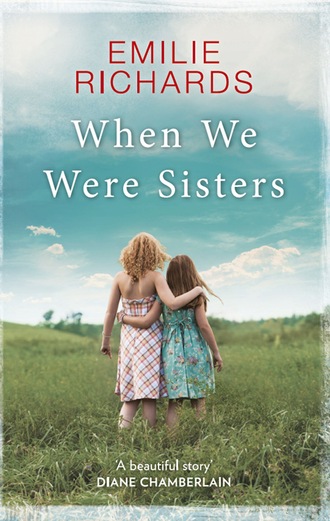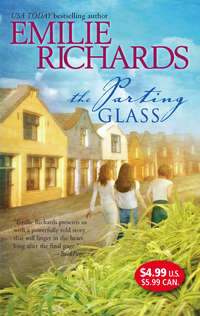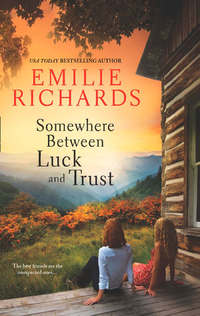
Полная версия
When We Were Sisters
I scrolled through my recent calls, but there were none from my wife. I thought maybe Robin had called to provide clarification or warn me what was coming. I did see an unfamiliar number with a Virginia area code, and hoped Pedersen hadn’t gotten up to his room and remembered something else he wanted to discuss.
I considered ignoring Cecilia, but I know her too well. She’ll continue to call until we finally speak. Cloudy skies had just turned to rain, and I didn’t want a conversation on the road during a storm. For the most part I don’t think phones and cars belong together anyway. That makes me hopelessly old-fashioned, but I can live with it.
Cecilia answered immediately. “How is she?”
For a moment I wasn’t sure who she was talking about. “How is who?”
The pause was pregnant. “You don’t know, do you? What, Kris? You haven’t checked your phone all evening?”
I turned off the engine. “How is who?”
“Robin was in an accident tonight.”
For a split second the world went white. I wondered if I tossed my cell phone out the window, would everything immediately return to normal? I would drive home. Robin and I would probably argue, and I would go to sleep with her fuming safely beside me.
I pulled myself back into the moment. “What happened? Is she okay?”
“She’s at the Inova Loudon Hospital. Where you should be. I’ll be on my way there as soon as I make arrangements. But the doctor says she’s going to be all right. Moderate to severe concussion, dislocated shoulder, maybe mild whiplash. They want to keep her a night or maybe two to do more tests. As a precaution.”
I’m no expert but that didn’t sound too bad. My heart began to slow. “Do you know what happened?”
“She was in a car with three other women. She had that dinner—”
I wondered how Cecilia knew about Robin’s dinner. “Go on.”
“The police think the driver of the car that struck hers might have had a heart attack at the wheel. He ran a stop sign and hit the passenger side of Robin’s car. He died.”
“Robin was driving?”
“No, the car she was riding in. Somebody named Gretchen was driving, and she was injured, too, but not badly. So was a woman named Margaret. She was taken by helicopter to a trauma center.”
I knew these women, had known them for years. My heart began to speed again. “You said four?”
“Talya was in the car, too.” She paused. “I’m sorry, Kris, but Talya was killed. She was sitting in the death seat.”
“Death seat?”
“Passenger seat. That’s what Donny calls it.”
I don’t remember exactly what I thought next. Maybe that tonight Michael Weinberg was trying to deal with the worst news of his life. That the unidentified call on my phone was probably from the Loudon County Sheriff’s Office or the hospital where Robin had been taken. That my children were now at home with somebody—who?—and I needed to get to them immediately. That my telephone had been turned off while all this was happening because I’d had an argument with Robin.
And finally that my wife, who I have loved since the first time I saw her taking photographs across a crowded room, was in a hospital grieving the loss of our next-door neighbor. Talya, the young woman who had shared so many good times with our family, the young woman who Robin was closer to than any other woman in the world except Cecilia.
Cecilia had remained silent so I could absorb this. I made my way back to our call. “Why did they call you? How did they know who to call?”
“They checked Robin’s cell phone. I’m listed under her contacts as her sister.”
And then I said something supremely stupid. “You were foster sisters.”
She snorted. “I have a flight to arrange.”
“You don’t have to—” But Cecilia had already disconnected.
She didn’t have to fly in. Who knows what she was leaving and who would suffer, but Cecilia would come anyway. Because in her heart, and in my wife’s heart, too, even though they don’t share a single gene, they are honest-to-God sisters, right down to their bone marrow.
3
Cecilia
I’ve never liked hospitals. Three months ago I spent two weeks incarcerated in one, and now I like them even less. Sure, I still realize the occasional necessity, but I also realize how important it is to be freed as soon as possible. On that one point alone I agree with insurance companies.
For the majority of my childhood I escaped the notice of doctors. On the rare occasion when Maribeth—the woman who gave birth to me—focused long enough to realize I was sick, we sat in emergency rooms and waited. Once she left me alone for hours after telling me she was going to the bathroom. When it was my turn to be seen, the staff refused because Maribeth wasn’t present. Just as they were about to contact the police she showed up again with a good enough story to explain her absence.
Growing up, I heard so many of Maribeth’s good enough stories that I don’t remember the juicier details. I only know our wait began all over again. It was nearly morning before they diagnosed pneumonia and gave her a prescription and instructions for taking care of me. The only surprising thing? I think she actually filled the prescription. That was unusual enough to be memorable.
The smallish hospital where the paramedics took Robin two nights ago looks like hospitals in well-to-do suburbs everywhere. Tan facade of mixed materials, clever use of glass and soaring ceilings. Fresh, clean lobby to promote confidence. By the time I arrived in Leesburg, almost forty hours after the accident, visiting hours had already begun for the day. Traveling to Phoenix, then scheduling a flight to Dulles was surprisingly difficult, but I didn’t have enough time to wheedle anybody’s private jet.
Donny accompanied me, all personal manager and bodyguard, and now he was the liar who was taking care of the business of getting me to the right floor. “My wife Jennifer and I,” he said in introduction before he asked where we could find Robin. The receptionist didn’t even glance at me.
Donny has been my manager for close to five years, and he has a genius for handling difficult situations or spotting them before they erupt. Today I wasn’t dressed as a big star. One of Donny’s shirts streamed over my tank top and baggy jeans, and my hair was pinned underneath one of his ball caps. No makeup hid my infestation of freckles, but tinted Harry Potter spectacles shaded my eyes. If anyone had caught me on camera this would have been a “before” shot. “Your Favorite Celebrities and What They Really Look Like.”
Luckily no one had realized I was in Arizona, and apparently no airline or airport employees had reported us, either, so nobody had followed us to the airport or sent photographers to greet us when we landed.
When we were alone in the elevator on the way to Robin’s floor he asked how I was feeling.
I’m not sure how a genuine nice guy makes it in this business. Donny looks like a high school history teacher—a little too preoccupied to remember to get his hair cut regularly or clean his glasses. He’s easy to look at, brown hair and eyes, even features, but he never makes an effort to be more. He has some kind of advanced belt in karate, and he’s been known to sail a twenty-four-foot sloop through Pacific Ocean squalls on his own. So he’s muscular enough to keep fans at a distance, but by no means a bodybuilder. Unless he’s in high-level negotiations or in danger of being photographed with me, his uniform is a faded concert T-shirt and discount store jeans.
The casual facade fades when he’s concentrating on contract concessions or higher royalties. He’s focused, determined and unfailingly polite. Nobody tries to take advantage of him a second time. Despite that, everyone likes Donny. And me? I would trust him with my life, and do.
“I feel fine,” I told him. “I’m not fragile. I’m not falling apart.”
“Nothing I said implied you were.”
“Thanks to you.” I glanced at him. “You kept that whole mess in Sydney under wraps. Not a single headline about my suicide attempt, or my bipolar diagnosis, or the way I shaved my head to get attention in the hospital.”
“If that’s a wig, I think you should keep it.”
I sent him a tight smile. Unlike Britney Spears I’ve never been bald, nor have I ever tried to commit suicide. And I’m not bipolar, although quite possibly my mother was—but how would I know since she abandoned me when I was nine?
Still, three months ago I had spent two difficult weeks in an Australian hospital crying my eyes out, and somehow Donny had kept that a secret.
“I’m sorry I jumped down your throat,” I said.
“Robin’s going to be fine.”
“As fine as somebody can be after she nearly dies and her next-door neighbor actually does.”
“You think her husband will be here?”
I didn’t. Today is Wednesday, and since Robin isn’t terminal, cynical me is pretty sure Kris will be at work. Talya’s funeral is probably sometime this afternoon. Her family is Jewish, and by custom the service should take place immediately. How can Kris get away from his office without weeks of preparation?
“I’m hoping he’s somewhere getting ready to attend the funeral,” I said.
“You’re not thinking of going, are you?”
I understood Donny’s subtext. If I were recognized, the service would be all about me.
“I hardly knew her. I’ll stay with Robin.”
We got off the elevator and found the right hallway. I bypassed the nurses’ station and headed right for my sister’s room. At the door I paused to listen for voices, but the room was silent. I pushed the door wider and walked in. Donny leaned against the wall outside, arms folded over his chest.
Robin was alone lying in the bed with her face turned toward the window. Her shoulders were hunched, and I doubted she was asleep.
“Robin?”
She turned, and I saw she’d been crying. “CeCe! I told you not to come.”
“Yeah, yeah.” I crossed the room and perched on the bed beside her. “Since when have I listened to you? I’m just sorry I couldn’t get here sooner.”
She sniffed, then she held out her arms for a hug. “How did you get here at all? Where were you?”
I hugged her gingerly, remembering the shoulder. “Arizona. Out in the middle of God knows where on a ranch. You saved me from having to get on a horse. You’re my hero.”
“You used to ride. You could have been a rodeo queen.”
“It’s been a long time since I made friends with a horse.”
Robin’s hair is a rich chocolaty brown, longish and straight, with bangs brushing her forehead. I touched a strand, swiping it off her cheek. I was thirteen when Robin and I became sisters, and I thought right away that her heart-shaped face needed bangs. She’s worn them ever since, and they highlight eyes as blue as her namesake’s eggs. Today she was pale, but normally she has the clear, rosy complexion of a milkmaid. The first word people use when they describe her is wholesome.
“I’m kind of surprised to find you here,” I said. “Donny checked this morning, but I thought maybe they sent you home after lunch.”
“The hospital has a special concussion program.” She made a face. “I have my own nurse navigator. She wants me to stay another night.”
“Why?”
“Just a precaution. I can’t seem to remember everything that happened when...” Her eyes filled.
“Thank God.”
“My thought, too.”
“So you’ll get out tomorrow?”
“Unless something else turns up.” The tears pooled, and she sniffed. “But I wanted to get out today. I want to be at Talya’s funeral.”
“When is it?”
“In an hour and a half. They’ll do it at the graveside.” Finally the tears spilled onto her cheeks, and she dabbed at them with her fingertips. “Kris said he would go and represent both of us, but just now when I called his office he was still in a meeting. He won’t make it in time.”
I swallowed everything I wanted to say. That took a while.
“He was here most of yesterday morning,” Robin said as I gulped. “But we didn’t talk much. I was in and out for tests. I’m not sure he realizes...”
I had to change the subject. “How’s the other woman... Margaret?”
“Holding her own. They think she’ll pull through.”
“That’s good.”
“It should have been me.”
I stared at her a long moment before I spoke. “Please don’t ever say something like that again, okay? You think you deserved to die more than she did?”
Words spilled out the way tears had a moment before. “I was the one sitting in the passenger seat on the way to the restaurant. When we were ready to leave Talya said I should sit there again, that she was happy in the backseat, but all through dinner I’d been feeling left out. I didn’t want to sit up front and listen to her and Gretchen talking over me. I wanted to sit in the back with Margaret, who was busy texting. I wanted to feel sorry for myself, like a sullen seventh grader.”
“And you feel guilty?”
“It should have been me in that seat. I should have been sitting next to Gretchen. Or maybe if I hadn’t debated seat arrangements with Talya, maybe those few seconds would have made all the difference. Maybe Gretchen wouldn’t have caught the red light on the way out of the parking lot, and we would have been well beyond the spot where that car ran the stop sign.”
“You know how self-defeating that kind of thinking is, don’t you? You didn’t look into the future and trade seats with Talya so you could stay safe. Reality is random. It was chance. And if it wasn’t, then God decided who would live and who wouldn’t.”
“You don’t believe that and neither do I.”
“Not the part about God, no. The part about random? Absolutely.”
Robin didn’t argue, but I could tell she wasn’t buying it. “I can’t even be at the funeral to say goodbye.”
I make decisions quickly. I’ve always had to. “Do you feel well enough to go?”
“I feel as well as I’m going to for a while.”
“Can you get up and wash your face? Comb your hair?”
“I had a shower earlier. I was fine.”
“Then do both. I have a dark skirt and blouse that will probably fit well enough in my suitcase. Or has Kris brought clothes for you to wear home?”
She shook her head, and the movement made her wince. For a moment I reconsidered. Maybe she really did need to stay here another night, more tests, more observation. Then I remembered the tears.
Robin so rarely cries.
“Donny’s here. He’ll go down and get my clothes for you. Meantime I’ll talk to the— What did you call her...?”
“Navigator. Nurse navigator.”
“That’s the one. If I can find her I’ll tell her we’re navigating you right out the door, and she can set up an appointment or whatever she’s supposed to do. But she’ll have to do it without you lying here.”
She bit her lip, considering. “Okay.”
That’s when I knew Robin really needed to go to the funeral. Because defying authority isn’t part of her emotional makeup. Or possibly whatever defiance she was born with was bled out of her one drop at a time by her sadistic grandmother. But this time? This time she was ready to do exactly what she needed to.
“Wash, brush. I’ll be back. Do you know where the cemetery is?”
“I think so.”
“I’ll have Donny find that out, too. We have a car and a driver. We’ll get you there in time.”
She was already swinging her legs over the side of the bed. “The hospital won’t be happy. They’ll try to stop me.”
I stood and leaned down to kiss her hair. “You’re kidding, right? I’ll make sure they’re thrilled beyond belief. You wait and see.”
4
Robin
Talya loved autumn, the changing colors, the smell of wood smoke and pumpkins piled high at farmer’s markets. So many October afternoons we sat in my garden sipping tea or home-brewed lattes, and admired borders of nodding sunflowers and the heavy perfume of sweet autumn clematis. I had a trunk of garden hats, and Talya always picked through them to find just the right one to match whatever she was wearing. Whenever I saw colorful or whimsical hats I bought them, just to delight her.
I loved Talya. We were just neighbors until she became pregnant with Channa and a month later I became pregnant with Nik. We used to joke there must have been something in the water at Meadow Branch, and our pregnancies brought us together. We shared morning sickness, traded maternity clothes, took bets on who would deliver first, since Nik was a big baby and showed signs of arriving early.
As our children grew so did our friendship, until recently when changes swept her in other directions. Now death had removed her from my life forever.
Cecilia reached over and covered my hand as the Town Car driver came around to open my door. Her long, perfectly shaped nails were painted the palest aqua. My nails were at best clean, my hand trembling.
“Channa will need you, Robin. Now and when she grows older. You’ll be able to tell her who her mother really was, what kind of woman and friend you knew her to be. Girls need to learn how to have and be a friend. It will help.”
I’m sure all over the world people think my sister is just an empty-headed publicity hound with big boobs and a bigger voice, but Cecilia hasn’t gotten where she is by chance. She understands the big picture. How else would she have gotten to the top?
“Michael will move away,” I said. The Weinbergs’ house would be filled with memories, and he and Channa would see Talya everywhere. They had never, as hoped, filled the house with children, and the stone and frame Colonial had always seemed too large for just the three of them. For two it would be impossible.
“If he does move, you’ll stay in touch. Talya would want you to.”
I squeezed her hand and dropped it. “You’re going to wait here?”
“We’ll park down the road to leave room for mourners. We’ll pull back around when it’s over.”
I didn’t ask her to come with me. Cecilia’s presence would be a distraction. When the door opened I stepped out into bright sunlight wearing her blouse and a skirt I had rolled three times at the waist. The glare gave me an immediate headache, and I fished in my purse for the sunglasses Cecilia had given me, nodded to the driver and started down a grassy slope to the graveside.
Channa and Michael, as well as his family and Talya’s, hadn’t yet arrived, but someone had set up a lectern with a guest book, and I signed my name and scribbled a quick condolence before I moved forward. Until I saw Gretchen sitting under a canopy in a row of chairs at the very back, I didn’t recognize anyone in the gathering of about sixty. Her black clothes didn’t suit her pale blond coloring, nor did the red-rimmed eyes or the narrow bandage across her forehead. I made my way around the crowd to sit beside her.
“This is my fault,” she said when I kissed her cheek in silent greeting.
“Of course it isn’t.”
“I should have seen him coming. I should have—”
I had an unwelcome glimpse of the SUV streaking toward us, a rocket about to launch. “There was absolutely nothing you could have done. He came out of nowhere.”
“Did you know there have been other accidents at that intersection? Other people have run that stop sign. Other people have died!”
It was like Gretchen, political to the bone, to focus on the civic problem instead of what was about to happen. But I nodded, because I understood. I wished I could be angry today instead of frightened and lonely.
Except, of course, I was angry. Angry at God, and angry at my husband who was supposed to be here to let the Weinbergs know how much Talya had meant to us.
“I didn’t expect you to come,” she said. “Not after... You’re...okay?”
“Okay enough. And you?”
“Just cuts and bruises. They let me out bright and early yesterday.”
“Thank God. And Margaret?”
“She’s out of the woods, but she’ll need rehabilitation. Lots of it.”
Her eyes had filled again. I looked away. “I repeat—this was not your fault.”
“You’ll tell me that for a while, won’t you? Because it’s not getting through.”
Nobody understood that better than I did.
A fleet of black limos pulled slowly into view. My heart beat faster, and I glanced at Gretchen. She had seen them, too, and she reached for my hand. We remained that way until the prayers were said, the eulogy given and it was time to line up to scoop dirt onto Talya’s coffin.
Afterward we didn’t approach Michael or any of Talya’s family, although almost a dozen neighbors I hadn’t noticed when I arrived joined us to flank the path as the family went back to their cars.
As she walked past, Channa saw the tears rolling down my cheeks and broke ranks. She darted over for a hug before she continued on with her father. Michael nodded to me, and I could see he was barely holding himself together. We would speak when we went to the house to sit shivah. If we could find words.
Only then, after I’d said goodbye to Gretchen and was walking up the road where I saw the Town Car in the distance, did I catch a glimpse of Kris alone in our silver Acura cruising slowly past, as if he were trying to find a parking space.
I kept walking.
* * *
Nik and Pet weren’t home when Cecilia and I arrived. Ideally Kris should have taken them out of class for the afternoon and let them accompany him to the funeral. I don’t believe in protecting children from death or from the necessity of goodbyes, and I would have brought them with me if I’d been in charge.
I don’t know if Kris chose not to include them because of conviction or logistics. And since he didn’t get to the service in time anyway, what did it matter?
“Get a drink and make yourself at home,” I told Cecilia. “I’m going to change. Then I’ll join you.”
She would pour herself a diet Dr Pepper, one of her few food vices. I always keep them for her, even if she hasn’t visited for months. It’s one of our little secrets. She never drinks any kind of soft drink in public. My sister is a vegan food crusader. Talya, who grew up in a kosher home, was less concerned about what she ate at my table than Cecilia is.
Upstairs I noted our bed wasn’t made, but the room was otherwise neat. I knew if I went into his closet Kris’s dirty clothes would be in his hamper and his shirts would be hanging according to sleeve length and color. He’s not obsessive, he’s just busy, and anything that saves him time in the morning is a bonus. I might find hair in the sink, or the toilet seat up, but his toiletries would be sitting in single file in the order he needed them each morning.
I wasn’t glad to be home, and I added that to my load of guilt. Views of the Weinbergs’ house would be a constant reminder of Talya. When would I stop expecting her to drop in with half a coffee cake her mother-in-law had baked or a handful of exotic herbs she wanted me to try?
I removed Cecilia’s skirt and blouse, dark brown designer pieces that had hung on my thinner frame like sackcloth, and folded them neatly. I pulled on leggings and an oversize T-shirt before I went downstairs again. I could see Cecilia outside on the deck. Blessedly it’s on the garden side of our property, and the Weinbergs’ home is barely visible through the trees.
There are no words to express how much I love this house and our garden, which I created myself and tend with only minimal help from a local landscaper. Meadow Branch is a newish development on what was formerly a horse farm. Our home was the original farmhouse, burgundy brick with a high peaked center gable and a ground level front porch that was probably tacked on as an afterthought.
The house was built in the late 1800s, when bathrooms weren’t recreational and bedrooms were mostly for sleeping, but it was so filled with character, so settled, that after one look, Kris and I knew it belonged to us. We didn’t allow the developer to tear it down to build two houses on our one-acre lot, as he could have. We bought it exactly the way it was, multiple flaws and all, and slowly renovated it without destroying its character. Eventually we added a master suite upstairs, and a combination family room and sunroom below, along with a compact studio for me and a dark room, which gets very little use since digital photography came to stay.










